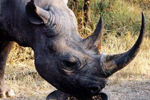At least 688 rhinos have been poached in South Africa this year, surpassing last year’s record of 668 with more than three months remaining in 2013, reports the country’s top environmental official.
In a speech given September 21 — the day before World Rhino Day — Minister of Water and Environmental Affairs Edna Molewa presented statistics showing a sharp rise in rhino poaching over the past four years. Her data also revealed a decline in the number of rhino-related arrests, suggesting increased sophistication of the illegal trade, where horns from source countries in Africa and Asia is generally trafficked to urban markets in Vietnam and China, where rhino horn is believe to cure a range of ailments and is also viewed as a status symbol. Rhino poaching has surged in recent years due to rising demand from a growing middle class in East Asia.
Efforts to combat the trade has largely fallen flat. Now some South African officials are pushing to legalize the sale of rhino horn stockpiles, arguing that flooding the market would collapse prices, thereby deterring poaching. But opponents say legalization risks creating new markets for rhino ivory, potentially hastening the demise of the world’s five remaining rhino species, all of which are considered endangered.

Chart showing the number of rhinos poached and rhino poaching-related arrests in South Africa 2010-2013
Related articles
Poaching jumps since South Africa announced support for legal rhino horn trade
(09/20/2013) South Africa has experienced an uptick in rhino poaching since Environmental Minister Edna Molewa called for legalizing the rhino trade, reveals analysis by the Environmental Investigation Agency (EIA).
Rhinos now extinct in Mozambique’s Limpopo National Park
(04/25/2013) Poachers have likely killed off the last rhinos in Mozambique’s Limpopo National Park, according to a park official.
South African reserve poisons rhinos’ horns to deter poaching
(04/11/2013) A game reserve in South Africa has taken the radical step of poisoning rhino horns so that people risk becoming ‘seriously ill’ if they consume them.
Rhino wars: documenting the poaching crisis in South Africa

(01/16/2013) In 2012 a record 668 rhinos were slaughtered by poachers in South Africa for the horns, which are used as scientifically-debunked medicine in Asia. Rhino poaching has hit record levels worldwide over the past few years, but no where is the carnage greater than South Africa, which houses well over half of the world’s rhinos. Thus it’s no surprise that when student filmmaker, Anne Goodard, arrived in South Africa to film zebra behavior, she quickly became enthralled by the dark and tragic drama surrounding the country’s rhinos.

(10/15/2012) 23,680 = the estimated number of wild rhinoceroses in South Africa. 35,000,000 = the number of American dollars generated by rhino hunting in South Africa. 97% = the percentage increase in illegally-hunted rhinos in 2011 from the national average in 1990. 30,000 = the number of pounds of rhino horns confiscated from poachers since 2010. 65 = the number of horns that have been stolen in South Africa from public display. 430…the number of rhinos killed this year, and counting…
Yuppies are killing rhinos, tigers, elephants
(09/07/2012) Yuppies, not elderly rural consumer, are driving the trade that is decimating some of the world’s most iconic endangered species, including tigers, elephants, rhinos, pangolins, and bears, said experts meeting at a workshop in Vietnam.